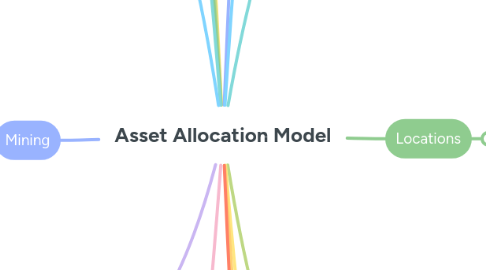
1. China
1.1. Trend
1.1.1. Decrease in Construction
1.2. Investment
2. Climate
2.1. Trend
2.1.1. Extreme weather affecting farming and housing
2.1.2. Insurance risk
2.2. Investment
2.2.1. Carbon capture
3. Commodities
3.1. Trend
3.2. Investment
3.2.1. Gold - increase with geopolitical risk
4. Defense
4.1. Trend
4.2. Investment
4.2.1. Defense stocks
4.2.2. Ammunition
5. Energy
5.1. Trend
5.1.1. Electification
5.1.2. Nuclear energy
5.1.2.1. SMRS
5.1.3. Uranium
5.1.4. Lack of funding to conventional oil
5.2. Investment
5.2.1. Small Modular Reactors (SMR's)
5.2.2. Uranium
5.2.3. New battery tech
5.2.3.1. Sodium
5.2.3.2. Silicon
5.2.3.3. Annonde
5.2.4. White hydrogen
5.2.5. Wind developments in western Europe
6. Mining
6.1. Trend
6.2. Investment
6.2.1. Rare earths
6.2.1.1. North America
6.2.2. Copper
6.2.3. Mineral reserves in Africa
6.2.4. Deep sea mining
7. Science
7.1. Trend
7.1.1. Genertic engineering
7.1.2. Biotechnology revolution
7.1.3. Pyshadelics revolutionizing pychiatry
7.2. Investment
8. Technology
8.1. Trend
8.1.1. AI replacing human generated content
8.1.2. Digital currencies
8.1.3. Web 3
8.1.4. Quantum computing
8.1.5. More data centers
8.1.6. Internet of things
8.1.7. Nanotechnology
8.2. Investment
8.2.1. Generative AI
8.2.2. Drones
8.2.3. Semiconductors
8.2.4. AI generated music
8.2.5. 3D printing
8.2.5.1. Houses
8.2.5.2. Cars
8.2.5.3. Food
8.2.6. AI chips
8.2.7. Data Centers
8.2.8. Wearables
8.2.9. Quantum computing
9. Food
9.1. Trend
9.1.1. Lack of nutrients in soil
9.1.2. Forever chemicals in water
9.1.3. Food wastage
9.1.4. Food scarcity
9.1.5. Water scarcity
9.2. Investment
9.2.1. Fertilizer
9.2.2. Regenerative agriculture
10. Geopolitics
10.1. Trend
10.1.1. Global conflict
10.1.1.1. Ukraine
10.1.1.2. Isreal
10.1.1.3. Iran
10.1.1.4. Taiwan
10.1.2. China crisis
10.1.2.1. Youth unemployment
10.1.2.2. Consturction industry decling
10.1.2.3. Real estate development
10.1.3. China decoupling
10.1.4. De-globalization
10.1.4.1. World fragmentation
10.1.4.1.1. Multipolar world
10.1.5. US polarization
10.1.6. Europes right wing drift
10.1.7. Japan golden period
10.1.8. Africa rising
10.2. Investment
11. Health
11.1. Trend
11.1.1. Next pandemic
11.1.2. Increased health expenditure as people live longer
11.1.3. Gene editing
11.1.4. Bioinformatics
11.1.5. Synthetic biology
11.2. Investment
11.2.1. Commercialization of healthcare
11.2.1.1. Devices
11.2.1.2. Software
11.2.1.3. Treatment
12. Locations
12.1. Trends
12.2. Investment
12.2.1. Brazil
12.2.2. Japan
12.2.3. Poland
12.2.4. India
12.2.5. Dubai
13. Macro
13.1. Trend
13.1.1. High interest rate
13.1.2. Excess consumer debt
13.1.3. PE debt
13.1.4. Unrealized losses on investments
13.1.5. Urbanization
13.1.6. Concentration of wealth
13.1.7. Supply chain fragility
13.1.8. Inflation
13.2. Investment
13.2.1. Diversification of cash
14. Manufacturing
14.1. Trend
14.2. Investment
14.2.1. Natural materials
14.2.2. Robotics
14.2.3. Raw materials
15. Real Estate
15.1. Trend
15.1.1. Remote work
15.1.2. Commercial real estate decline
15.1.3. Lack of real estate supply
15.2. Investment
15.2.1. Buying land
15.2.2. Foam for housing construction
15.2.3. Building materials
16. Society
16.1. Trend
16.1.1. Demographics
16.1.2. Extended Adolesence
16.1.3. Crisis of young men
16.1.4. Lack of meaning, comunity
16.1.5. Sexuality
16.1.5.1. Trans
16.1.5.2. Artificial wombs
16.1.6. Human migration
16.1.6.1. Border pressures
16.1.7. Improved longevity
16.1.8. Ageing population
